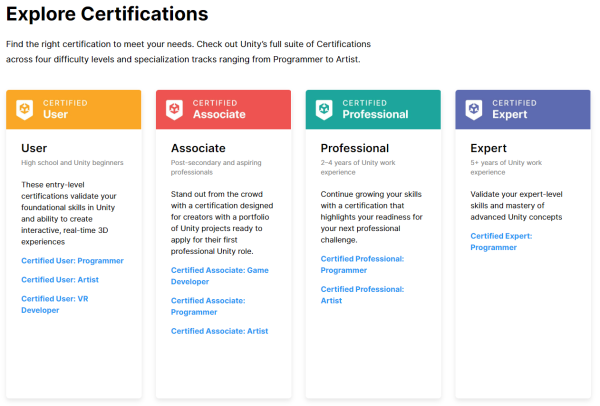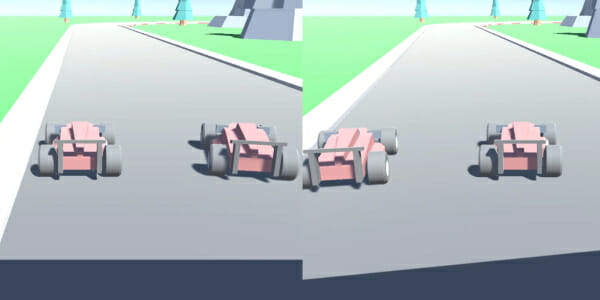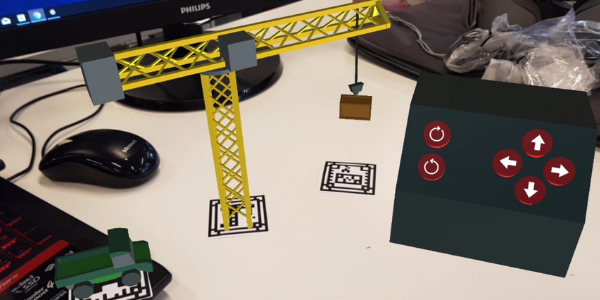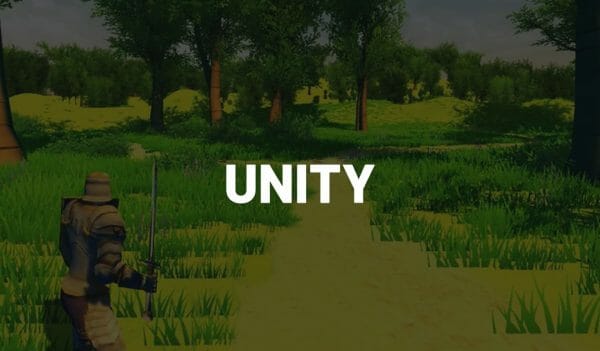How does a Unity game developer prove their skills? While portfolios are a necessity, there is another fantastic option: Unity Certification.
Whether you’re just starting out or have been making games for a long time, this is a difficult question. However, it’s a question that comes up often in the professional world. Numerous situations will require you to show evidence you actually do know what you’re doing.
In this article, we will endeavor to explore what Unity Certification is, why Unity Certification is definitely worthwhile to pursue, and how you can start preparing to earn your certification.
Let’s jump in!
Table of contents
An Overview of Unity Certification
In this section, we will discuss what Unity Certification is for those new to the topic. If you already have a good idea of what Unity Certification is, feel free to skip ahead to find out why Unity Certification can help you and get guidance on prepping for an exam.
In our exploration of the Unity Certification process, we can’t ignore valuable resources such as the Unity Associate Programmer Certification Pathway and the Unity Associate Game Developer Certification Pathway. These comprehensive training programs, available at Zenva, are meticulously designed to equip you with essential skills like C# programming, debugging, UI, asset management, and many other game development aspects. By demystifying complex concepts and providing hands-on experience through real projects, these courses are perfect companions in your journey to achieving Unity Certification and breaking into the thriving game development industry.
What is Unity Certification?
The Unity Certification program is a set of exams aimed at testing Unity developers’ core skills in game development and the Unity engine. The exams were developed meticulously by Unity through research, and with coordination between both testing specialists and game development experts.
At current, the tests are administered by Pearson VUE, a branch of the widely-recognized educational company Pearson, which is aimed at specifically providing testing for professional certifications. As such, Unity Certifications are regarded very highly in the professional world due to the extensive work and credentials associated with them.
The exams for Unity Certification are divided between a few different specialties and different levels of experience – giving every user an opportunity to pursue certification. Likewise, this division allows the prices to vary – starting as cheap as $60 and going all the way up to $350 for experts (with some bulk purchasing options for schools).

How are the Unity Certifications Structured?
As mentioned above, the Unity Certifications consist of several different exams depending on your level of experience and your specialty in that experience level. We will briefly discuss what exams are available so you can get a grasp on what you personally may wish to pursue.
Certified User Unity Certification
This is the beginner’s level exam aimed at people who’ve just learned a little bit of Unity. To put it into better perspective, this exam was one that was made to be appropriate for high school level students as well, so there’s no expectation you’ve necessarily even made more than a couple of hobby games.
At this level, Unity offers three different certification specialties, each with a separate exam.
- Programmer: This is probably what would be considered the main certification for Unity itself at this level. In this one, users are evaluated on how well they know the fundamentals of using Unity, such as how to make projects and Prefabs, navigate the editor, and so forth. This exam will, of course, also test your basic C# knowledge – including quite a lot of focus on Unity-specific library functions and accessing components. However, the main point is to see if you’re able to read, write, understand, and debug basic code elements that will be used all the time.
- Artist: This level tests how well you know Unity’s tools in order to design 2D and 3D scenes. This includes things like importing the assets correctly and manipulating objects in the scene. You’ll also be expected to know a little bit about lighting, materials, and cameras.
- VR Developer: For this certification, users are tested specifically on how well they can adapt a Unity project for VR. This includes elements related to understanding how to even set up a VR project, how to deal with movement based on hardware, and how to optimize your elements to be VR-ready.
Certified Associate Unity Certification
This certification is primarily designed for those ready to actually start working in professional development. The general assumption is that you’ll probably already have a few simple projects under your belt, and be ready to justify the fact you can, in fact, build games.
Like the User Certification level, this level also has three different exam options to specialize in:
- Game Developer: This particular exam focuses on testing whether you can make a game with Unity. While there is some C# programming involved, of course, the major aspects are much larger in scope. You’ll be expected to understand how to take a game from idea to completion. You’ll also be expected to know, relatively well, all the tools Unity offers such as audio, animation, physics, and so forth. Another way to think of it is this exam is for those looking to make sure they understand the bigger picture of game development.
- Programmer: At the Associate-level, the Programmer Certification focuses a ton more on C# scripting. You’ll be expected to have a solid understanding of working with Unity’s API to script behaviors and objects (including UI elements). This level also starts examining code efficiency, such as if you understand best practices for data structures. There is also a strong focus on being able to debug.
- Artist: Continuing somewhat from the Artist User Certification, the Artist Associate Certification focuses on more advanced uses of the Unity tools for artistry. This includes working with tools like Shader Graph and ProBuilder, understanding different lighting effects, implementing Level of Detail, and beyond. If it has to do with presenting the assets, be prepared for it to be on this exam.
Looking to prep for these exams? Try out Zenva’s Unity Associate Programmer Certification Pathway & Unity Associate Game Developer Certification Pathway!

Certified Professional Unity Certification
The Professional Unity Certification is where we really start getting into more advanced users. This certification level is focusing specifically on those who have probably up to 4 years of making professional Unity games. Another way to think about it is this certification is perfect for those who are already game developers but want that coveted promotion and need something extra to prove themselves.
This level focuses on two specific specializations for its exams:
- Programmer: At this level, you’re already expected to have long since mastered the fundamentals. So, the focus on this exam turns to more advanced C# programming. You’ll be tested on things like being able to program a render pipeline, working with teams on coding, and even being able to optimize the game with how you code. There is also some focus on applications as well at this level.
- Artist: At this level, artists aren’t tested much differently than before – the only expectation difference is your level of understanding. As such, you’ll need to be a pro at being able to light scenes, work with particle systems, deal with animations, and similar. There is also a bigger focus on teamwork aspects to ensure you can work with big-budget productions.
Certified Expert Unity Certification
This is the last level of certification, and as expected, it’s focused on the bravest and most experienced game developers. In general, this certification is best for those who have worked with Unity for at least 5 years, if not more. It’s also a relatively safe assumption that if you need this certification, you’re working in the wider game industry as a whole.
At this level, there is only one certification exam for Programmer. The exam focuses on two things. The first is simple project management principles, such as being able to scope the project and review it to polish and refine the game. The second is obviously the coding part – where you’re going to have to know how to work with advanced algorithms and mathematics, as well as evaluate your code to improve it to its utmost efficiency.

Why You Should Get Unity Certification
So, why should you get Unity Certification? Is Unity Certification worth it? In this section, we’re going to discuss the three major reasons why Unity Certification may help boost your position regardless of your personal goals.
As part of your journey to Unity Certification, don’t forget to check out Zenva’s products. The Unity Associate Programmer Certification Pathway and the Unity Associate Game Developer Certification Pathway are comprehensive course bundles designed to help beginners prepare for the official Unity certification exams. By offering a foundation of practical knowledge and useful tools, these resources are invaluable for anyone looking to break into the gaming industry.
Unity Certification Helps With Job Hunting
One of the core reasons the Unity team invested in their Unity Certification program was to help Unity developers with job hunting.
Job hunting for any position, game development or not, is very tough. You’re generally up against 10s or 100s of other applicants for the same position. Even if your application is lucky enough to get past the initial resume review process, the competition will only get thicker.
As such, the key goal of any applicant is to make themselves stand out from their competition. When it comes to game development, the more you can prove you know how to make games (or provide the subspeciality the company is looking for), the better your standing.
However, almost every game development applicant will have two items: their work history (or education history for those starting out), and their game developer portfolio. So, even if you make great games, you’re going to need to find another angle to help push yourself to the top of the pile.
This is where Unity Certification comes in. In an industry where certifications are extremely rare, Unity Certification stands apart. It is widely recognized as a solid credential to prove your skills due to the exams themselves and the cost & time involved in obtaining the certification. They are so accepted in the industry that a good number of Unity-based job postings will even list Unity Certifications as a preferred requirement for the position.
To put it another way, if you were in HR, who would you hire:
- The applicant who has previous experience and a portfolio OR…
- The applicant who has previous experience, a portfolio, and certification proving they know Unity
The answer here is probably going to be two – so you can see how Unity Certification can be an extra boost that will help you shine compared to other job hunters. It’s just a good piece of evidence you know how to make games, and since not everyone will get certified, it can only help you professionally speaking.
Unity Certification Prepares Teachers
Teaching is a challenging skill set to develop. Not only do you have to understand the subject matter you’re teaching, but know how to tailor that content to your audience.
This second part is particularly important. If what you’re teaching is too easy for the audience, they’re going to get bored and disengage. If what you’re teaching is too difficult for the audience, they’re going to get frustrated and disengage. There is a reason we don’t teach physics and calculus to kindergartners or teach high school students the Alphabet song.
So, when it comes to Unity, how can a teacher prepare? Surprisingly, the Unity Certification process is a great answer to this.
Obviously, by preparing for a Unity Certification exam, you’ll have to fulfill that first part of actually learning Unity and proving that you do know the subject matter. Thus, this benefit speaks for itself.
However, as Unity divides its certifications by experience level, you can also choose to prepare for the exam that suits the audience you most want to teach. By forcing yourself to prepare for the proper level exam, you achieve two things. First, you make sure you’ve refreshed in your mind the materials most relevant to your audience. Second, you unintentionally use Unity to guide you on what fundamentals you actually need to convey to your students.
So, once you pass your exam, you can use the exam as an example of how you should structure your own learning materials. This helps you save tons of time, and makes sure you have the right direction for what you want students to take away.
As a side benefit, for teachers focused on self-guided learning online by providing online courses, having Unity Certification can also be a great selling point!

Unity Certification Challenges Hobbyists
The last benefit of getting Unity Certification may surprise you – as it has nothing to do with the professional world.
Plenty of Unity developers out there would qualify more as hobbyists. While the professional world may be a long-term goal, the main goal is simply to have fun, make some awesome games, and learn more Unity skills along the way.
That being said, learning more Unity skills is a big component for hobbyists, especially as many are self-taught. And, if you’ve ever tried to teach yourself a new skill, you know it can be extremely hard to plan an ideal learning path. Even with numerous courses out there, you can still often hit a wall at one point wondering, “Where to next?”
This is the sneaky way in which Unity Certification can benefit the hobbyist. As mentioned, these certification exams are divided into different levels, going from beginner to expert developer. While not required, the subtle idea here is you take the certification exams in order since it’s a designed progression.
However, this subtle idea of taking them in order also gives you a core learning path to subscribe to. By following this progression and prepping for each exam, you can challenge yourself to learn exactly what would be expected of you at each level. In this way, you don’t have to question, “What’s next?” Unity Certification guides you exactly on the skills you’ll want to learn in order to hit the next step of your Unity development journey.
Likewise, this means you can more easily choose courses to achieve those goals, plan projects that would implement elements you need to know, and so forth. Plus, if the need should arise, you’ll be ready to take the Unity Certification exams at any point.
Overall, though, Unity Certification can still play a key role for hobbyists and helps describe an ideal path for developers to follow.
How to Prepare for Unity Certification
So perhaps at this point, we’ve convinced you to obtain Unity Certification – or at least convinced you that looking into these certifications is worth your time. This is where we come to our final section: how to prepare for Unity Certification. We’re going to cover the three major steps that will be involved, though the second part of this is the most important.
Understand Unity Certification Testing Procedures
Before you jump into other prep work, you’ll first want to do a bit of research into the Unity Certifications. Even though this seems common sense, it’s also an easy step to just skip over and take the “you only live once” route.
The most important aspect here is to simply tailor your expectations to understand what is required of you when the testing day rolls around. This way you can make sure to set aside enough time to take your exam, and also just generally prepare your environment to best suit your exam-taking needs.
However, you’ll also want to be sure to use this research time to narrow down your focus as well as to which exam you’re actually going to take.
Below, we’ve made a quick list of some of the most crucial information you’ll want to know going into your exam:
- These exams are proctored – so you are going to have to deal with a person watching over your shoulder.
- While Pearson VUE does have some scatterings of on-site testing centers, the exams are primarily designed to be taken online.
- The number of questions varies by exam, ranging from as little as 40 questions up to 100 questions in total.
- With the possible exception of the User Certification level, the tests are timed. We’ve listed the time limits below, but keep in mind it’s recommended you add an extra 15 minutes to your schedule to allow time for reading instructions and so forth:
- Associate: 90 minutes
- Professional: 105 minutes
- Expert: 165 minutes
- If you fail, you can retake the test. For a second attempt, you must wait 15 days. Additional attempts require a 90-day waiting period.
- Unity Certifications are only good for 3 years. You must retake the test routinely to maintain your certification.
There are more questions you might have than we answered here, so we highly suggest checking out the FAQ section from Unity’s own website for further details. Regardless, do the legwork and make sure you have a solid understanding of your specific certification aims.

Unity Certification Prep Courses
Perhaps not surprisingly, if you’re going to get a Unity Certification, you kind of have to learn Unity and game development. How much you have to learn will depend on the exam you’re taking – which is why the step above is crucial. That’s the juncture you decide what level you want to aim for, which informs which kind of coursework you want to look for.
This being said, it’s important to consider the kinds of courses you pick. There is no shortage of Unity learning material out there, as it is a very popular engine. However, some coursework is definitely better than others. Our advice? Make sure to pick courses that aren’t aimed solely at exam passing. Instead, you’ll want courses that help encourage you to fully understand game development so you can continue to expand your skills.
We also highly recommend finding courses that have a project-based focus. Not only does this force you to learn in a more practical manner, but also helps you discover different game mechanics and build a portfolio. This way, you essentially kill two birds with one stone.
As a bonus, you may wish to search for courses that are intended as a series (i.e. curriculums). It’s much easier to build your skills consistently when courses are designed around that single idea of continuity. While not required, obviously, it can be a lot easier than picking and choosing courses at random from sites like YouTube or Udemy.
For those just getting started with Unity, though, here are some fantastic resources to start your Unity education off with (all of which are beginner-friendly):
Zenva’s Unity Associate Programmer Certification Pathway & Unity Associate Game Developer Certification Pathway
Zenva’s Unity Certification Pathways are specifically designed with getting Unity certified in mind. Both curriculums are hand-tailored to their respective associate level exam – covering everything you’d need to know about Unity to pass. This includes the foundations of Unity for those with no experience, game development processes, specific game projects, and more. Each curriculum also features an easy-to-access practice exam that will let you test your knowledge and ensure you’re ready for the real deal!
Unity Game Development Mini-Degree
This curriculum is designed around learning a little of everything that Unity has to offer. This includes things such as working with the UI, working with art tools like ProBuilder, using particle systems, building worlds, and so forth. There are also several different kinds of projects featured, including an FPS game, an idle clicker, a kart racing game, and so on.
As the name suggests, this curriculum is all about VR. Of course, you’ll learn the coveted fundamentals of Unity. Past that, though, you’ll get to experience a lot of VR-specific mechanics such as how to get players to move, how to work with different controller setups, and other essential knowledge. The curriculum also covers the XR Interaction Toolkit, which has become a core focus for VR development with Unity.
Retro Game Development Academy
With this curriculum, the focus is entirely on 2D game development. Students will make a constant stream of retro-inspired games such as Pong, platformers, base defense, and more. The curriculum even covers a bit of how to implement local multiplayer as well. Given the simple nature of the projects, this curriculum is fantastic for those wanting to build up their portfolio.
2D RPG Academy & 3D RPG Academy
Although two different curriculums, these resources have the same focus of covering RPG creation (just with different kinds of assets). The courses cover a variety of skills required for these games, including action and turn-based combat styles, roguelike procedural generation, character customization, and beyond.
Strategy Game Development Academy
This course series covers strategy games and their specific mechanics. This includes RTS games, turn-based games, city-builders, and tower defense games. Along the way, students explore a good number of required features, ranging from technology trees to designing enemy AI – all fantastic skills transferable to other projects.
Survival Game Development Academy
This curriculum entry on the list is a bit unique. Instead of many small projects, this curriculum has you build one big, complex survival game project. Starting from the zero-Unity experience, you can learn player mechanics, inventory systems, crafting, base building, and enemy combat. You’ll also get to explore making a save system – a core need for many games.
EdTech Game Development Academy
Last on the list, this curriculum focuses a bit more on making educational game projects and utilizing more advanced technology. Students can learn things as simple as making quizzes with Unity or working with Cinemachine to create cutscenes. On the other end, though, students can also learn to utilize tools like Azure to make voice-commanded applications or to bring in third-party API data.

Take Unity Certification Practice Tests
Last in the preparation steps is something kind of obvious: take practice tests.
Much like any sort of certification or big test like the SATs, there are plenty of resources out there that let you practice the tests. Obviously, legitimate sites won’t have the same content exactly as the exam. However, they will give you a fantastic idea of the sorts of stuff you may have to know and a better understanding of the experience level you’ll need to reach to pass.
This being said, be aware of two things. First, this step is optional. It can definitely help if you’re nervous, but it’s not required. If you feel confident, you can go straight to the exam if you wish. The practice tests are just there if you need them, as everyone practices in different ways.
Second, there are a lot of illegitimate sites out there that offer practice tests. There are evens some shady sites that claim to offer the actual exam in advance. Obviously, this would hardcore violate the Terms for these exams, so they are not recommended.
Instead, your best bet is to actually purchase practice tests from Pearson VUE itself. After all, who better to give you practice exams than the people running the exams in the first place?
There are some free resources available as well, but your mileage will vary with them. However, if you feel they’ll help you practice, by all means, use what you can.
Unity Certification Takeaways
Despite all the big talk, we acknowledge Unity Certification isn’t for everyone. Some developers absolutely prefer going the pure portfolio route – and this is a totally valid way to go about showcasing your skills. In fact, even with Unity Certification, having a portfolio can only help (and it’s also free for the budget conscious).
However, Unity Certification is nothing to ignore either. For many Unity developers, it can be a great piece of evidence to add to one’s resume. On the other spectrum, it can also be a simple way to structure how you learn Unity to ensure the best results for your time. It’s also a very accessible certification compared to others in the tech space. So, all in all, Unity Certification can be a fantastic and worthwhile pursuit to aim at.
A great way to fast-track your journey is to consider Zenva’s Unity Associate Programmer Certification Pathway and the Unity Associate Game Developer Certification Pathway. These all-inclusive course pathways are specifically designed to align with Unity’s certification syllabus – covering topics such as C# programming, UI, asset management, and more – and will equip you with the practical skills and knowledge needed to excel in the exam and beyond.
We hope this article has given you some essential stepping stones to choose the right path for you when it comes to Unity Certification. Good luck with your Unity game development, and we wish you the best.
- Official Unity Certifications Page
- Pearson VUE Unity Certifications Page
- Zenva’s Unity Associate Programmer Certification Pathway
- Zenva’s Unity Associate Game Developer Certification Pathway
- Zenva’s Unity Game Development Mini-Degree
Did you come across any errors in this tutorial? Please let us know by completing this form and we’ll look into it! FINAL DAYS: Unlock coding courses in Unity, Godot, Unreal, Python and more.







